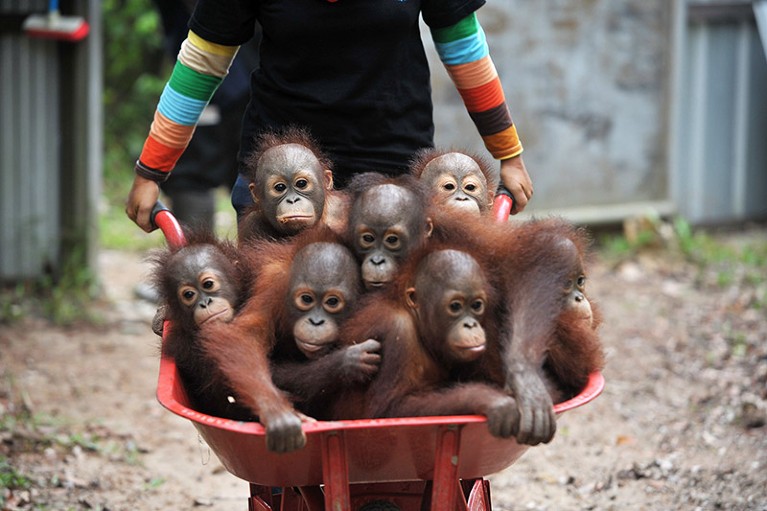Hello Nature readers, welcome to your daily round-up of the top science news.

Credit: Dasril Roszandi/NurPhoto/Getty
September’s best science images
A wheelbarrow full of baby orangutans heading to ‘forest school’ in Ketapang, Indonesia, is one of our picture editors’ picks for best science photos of the month. International Animal Rescue recovered the orangutans from residents who were keeping them as pets. The animals will be taught to fend for themselves before being released back into their natural habitat.
‘Test-tube’ evolution wins Chemistry Nobel Prize
Three scientists have won the 2018 Nobel Prize in Chemistry for pioneering ways to speed up and control the evolution of proteins. Chemical engineer Frances Arnold devised a method for inducing mutations in bacterial enzymes and then screening and selecting the bacteria to speed up and direct enzyme evolution. “It’s like breeding a racehorse,” says Arnold.
Arnold was awarded half of the prize; the remaining half was shared between biochemists Gregory Winter and George Smith. Smith pioneered a method known as phage display that Winter used to evolve antibodies adapted for use as human therapeutics. In 2017, a treatment that Winter’s company developed for rheumatoid arthritis was the world’s top-selling drug.
China’s spending spree on African science
China wants to train Africa’s next generation of scientists as part of its US$60-billion investment plan in the continent. China will offer 50,000 scholarships for African people to study in China, opportunities for another 50,000 people to travel to seminars and workshops, and scholarships for postgraduate training in China and at African institutions. Policy experts say that it’s essential that Africans hold the reins of any initiatives to ensure that the continent benefits.
Peru plans clean-up for Amazonian oil field
Peru’s government is taking its first steps towards cleaning up the damage done by oil producers in the country’s oldest and largest Amazonian oil field. Poorly regulated companies dumped billions of litres of wastewater and other toxic substances into the country’s rivers and tropical forests for 40 years. The remote region of northern Peru is inhabited mainly by indigenous people, who have fought for more than a decade to get the government to commit to remediating the polluted sites.
Japan set to allow gene editing in human embryos
Japan has issued draft guidelines that allow the use of gene-editing tools in human embryos, opening the door for research that is banned in many other countries. Manipulating DNA in embryos could reveal insights into early human development and, maybe someday, fix disease-causing genetic mutations — but critics worry that the technique could lead to genetically engineered ‘designer babies’. If adopted, the guidelines would ban the manipulation of human embryos to be used for reproduction, although the restriction would not be legally binding.
FEATURES & OPINION
What ‘data thugs’ really need
Bioinformatician Keith Baggerly’s painstaking work checking cancer research results eventually led to retractions, lawsuits and halted clinical trials. He argues that it’s long overdue for the scientific community to work out how to make these kinds of investigations easier. Rather than relying on “self-motivated data vigilantes”, scientific funders should take on a checking role to make sure that future funds are well spent.
Three case studies for co-production
The people who should benefit from science are increasingly shaping how it’s done. Nature meets three research groups who say a community-based participatory approach is challenging, time-consuming and, ultimately, much more powerful than conventional research.
Why Donna Strickland’s Wikipedia page matters
Back in May, Wikipedia rejected an entry on optical physicist Donna Strickland because she wasn't famous enough. Yesterday, she won the Nobel Prize in Physics. (The two male physicists with whom she shared the prize did have Wikipedia pages.) A scroll through the history tab of Strickland’s page, which records the progress of her recognition in real time, “feels like a metaphor for a historic award process that has long been criticized for neglecting women in its selection, and for the shortage of women’s stories in the sciences at large,” says The Atlantic.
Kelly, the sassy dolphin
Kelly the captive bottlenose dolphin is known as a trickster, a charmer and a shrewd planner, who worked out a way to stash items in her pool to maximize her rewards when they were returned. Kelly became famous when she seemed to care for seven of her fellow dolphins after they were all swept out of a marine park in Mississippi by Hurricane Katrina. But does Kelly really have her own distinct and stable personality? Does any dolphin?
